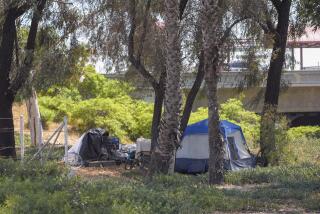Why Do We Feel Free to Walk on By?
- Share via
“They’re worse in Chicago,” said my friend Don.
“No,” I insisted. “New York’s are the worst--the major leagues.”
“Well, I think they’re even worse in parts of downtown L.A. because there’s no one else on the streets,” said Don.
Suddenly I had to stop and remind myself: We’re talking about people. We were having an argument over which city has the most depressing homeless population. It’s not a new problem, but one that seems to be gaining a force of its own, an unstoppable catastrophe.
Another friend, who constantly tours the country with a national theater company, tells me that every single town he visits now has a homeless population. Parks that were once community gathering places have become campgrounds for people just passing through. My friend describes the sidewalk sleeping scene in his own Manhattan neighborhood as “a Pravda photo op.”
Journalists have looked at this problem. We’ve all read and seen heart-wrenching profiles in newspapers and on TV. Explanations have been offered for the homeless explosion of the last four years. There are the homeless mentally ill--victims of the poorly planned closure of mental institutions. There are the down-on-their-luck ordinary people--single moms, dads let go from closed industrial plants, working poor who cannot afford expensive housing. There are the alcoholics and addicts. And finally, there are those who choose to be homeless--runaways, bohemians, hobos--people who find an odd kind of romance in the streets.
Increasingly, I move around them, blocking them out. I do sometimes stop and ask myself how did I become this hardhearted? Is it the sheer magnitude of the problem? I stopped giving money when I became aware that the same people were asking year after year. Most of the people who took up permanent residency in the streets appeared to be alcoholic or crazy. One of them once tried to kick my child.
Lately, I’ve been avoiding shopping areas where I know I’ll have to run through a gantlet of panhandlers. One day a couple of guys were sitting in front of my favorite cheese shop, spitting sunflower seed shells at people while they asked them for spare change.
Merchants in some areas have begun to campaign against “aggressive panhandling,” asking patrons to give not money but cards listing the location of social-services agencies. Perhaps there’s no better sign of our time than the symbol of this campaign: an outstretched hand with a big red slash mark across it.
Horrible though this is, I thought I had burned out on guilt a long time ago. That was until I went to New York and saw people lying in gutters as other people stepped out of limousines practically on top of them. It seemed as if every doorway of every gilded and stone and marble architectural wonder held a huddled, dirty body. I walked through Grand Central Station, where every tunnel and cranny is a place that a homeless person calls home.
And yet I still didn’t feel like giving any of these people the money they frequently demand because I would like to believe that we, as a people, are capable of solving this problem. Solving--not just momentarily absolving ourselves of blame. But even in this crucial election year, neither of the presidential candidates proposed anything like a solution. Nobody offered a compromise between the crackdown spirit of the right and the giveaway tendency of the left.
We are the private sector, and we are not solving anything with a thousand scattered points of light. We need a beacon.
On my last day in New York, I took a ride to the Upper West Side, the first place I ever lived on my own. I had occupied a tiny room then, with a bed, a dresser and a sink, and felt lucky to find something for $55 a month. I was mildly depressed the whole time I lived there. The high point of my day used to be walking out on Broadway and hearing the street musicians play hock-shop horn and washboard bass. I’d always save a quarter to thank them for turning 110th Street into Birdland.
Now, 20 years later and a lot better off than I was even four years ago, I walked around the streets where I was once down if not out. And there he stood--a street-corner Charlie Parker playing a melancholy version of “My Funny Valentine.”
I don’t know if he was homeless or even impoverished. But in the name of all the people whose bodies I bypassed at Grand Central, I gave him a five and thanked him for his song.
I felt better and he felt better. But the streets keep getting more crowded all the time.
More to Read
Sign up for Essential California
The most important California stories and recommendations in your inbox every morning.
You may occasionally receive promotional content from the Los Angeles Times.










